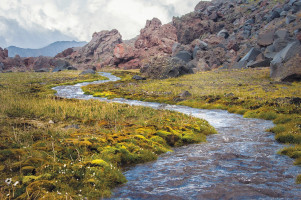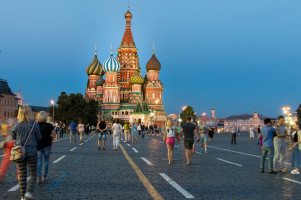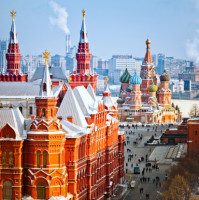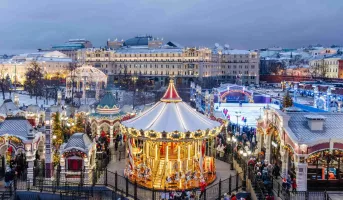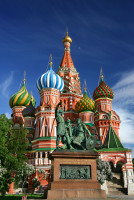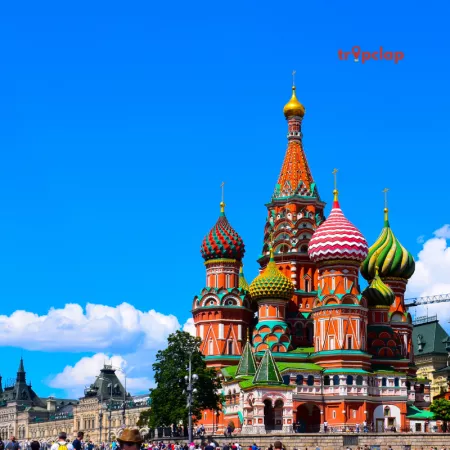
Russia
Duration
10 to 14 Days
10 to 14 Days
Best time to visit
Jun-Aug
Jun-Aug
Theme
Hill Station, Heritage
Hill Station, Heritage
Russia Travel Guide
Russia, the largest country in the world, is known for its rich history, diverse geography, and vibrant culture. From the iconic Red Square in Moscow to the stunning palaces of St. Petersburg, Russia offers a blend of tradition and modernity that captivates travelers from around the globe. With its famous ballet, literature, and architecture, Russia has a unique allure that draws tourists seeking an unforgettable experience.Top Attractions in Russia
- The Kremlin, Moscow
- Hermitage Museum, St. Petersburg
- Trans-Siberian Railway
- Lake Baikal
- Peterhof Palace
Russia is Famous for
Russia is famous for its rich history, iconic landmarks, and cultural heritage.Top Attractions in Russia
- Exploring the historic Red Square
- Cruising along the Volga River
- Witnessing the beauty of the Golden Ring towns
- Experiencing the White Nights in St. Petersburg
- Visiting the ancient city of Kazan
What's Great about Travelling to Russia?
- Immersing in rich history and culture
- Exploring diverse landscapes, from mountains to lakes
- Experiencing vibrant cities with bustling nightlife
- Enjoying world-class ballet performances
- Savoring delicious Russian cuisine
What's Not So Great about Travelling to Russia?
- Language barrier for non-Russian speakers
- Harsh winters in some regions
- Long distances between attractions
- Complex visa process for some nationalities
- Cultural differences in customs and etiquette
Travel Tips for Russia
- Check visa requirements before traveling
- Use public transportation in cities
- Stay cautious of pickpockets in crowded areas
- Respect local customs and traditions
- Learn basic Russian phrases for easier communication
Important Russia trip information
- Ideal Duration: A minimum of 10-14 days to explore major attractions.
- Best Time to Visit: Summer months (June to August) for milder weather.
- Nearby Airports and Railway Stations: Moscow Sheremetyevo Airport, St. Petersburg Pulkovo Airport, Moscow Railway Station.
Top 4 Places to visit in Russia
Per Person
23,499
*EXCLUDING APPLICABLE TAXES 4.4 Ratings
( 314 Reviews )
( 314 Reviews )
Per Person
1,32,499
*EXCLUDING APPLICABLE TAXES 5.0 Ratings
( 55 Reviews )
( 55 Reviews )
Per Person
64,500
*EXCLUDING APPLICABLE TAXES Per Person
38,461
*EXCLUDING APPLICABLE TAXES 5.0 Ratings
( 393 Reviews )
( 393 Reviews )
Per Person
69,990
*EXCLUDING APPLICABLE TAXES 4.9 Ratings
( 362 Reviews )
( 362 Reviews )
Per Person
76,000
*EXCLUDING APPLICABLE TAXES 5.0 Ratings
( 393 Reviews )
( 393 Reviews )
FAQ's on Russia
Q1: What is the best time to visit Russia?
The best time to visit Russia is during the summer months from June to August when the weather is pleasant, and popular attractions are open. However, if you are interested in winter activities like skiing or seeing the famous Russian winter landscapes, consider visiting from December to February. Keep in mind that major cities like Moscow and St. Petersburg can get crowded during peak tourist seasons.
Q2: Do I need a visa to travel to Russia?
Yes, most visitors to Russia need a visa to enter the country. The process can be a bit complex and requires an invitation from a Russian organization or individual. Some exceptions apply to certain countries, so it's essential to check the specific requirements based on your nationality. Plan ahead and apply for your visa well in advance of your trip.
Q3: What are the must-visit attractions in Russia?
Russia is vast and diverse, offering a wide range of attractions. Some of the must-visit places include the Red Square and Kremlin in Moscow, the Hermitage Museum in St. Petersburg, the Trans-Siberian Railway, and the stunning Lake Baikal. Don't miss the historic cities of Kazan and Veliky Novgorod for a glimpse into Russian culture and history.
Q4: Is Russia a safe place to travel?
Russia is generally safe for tourists, but like any other destination, it's essential to remain vigilant, especially in crowded tourist areas. Avoid displaying valuables openly and be cautious of pickpockets in busy places. Certain regions, particularly near the borders, may have travel advisories, so check with local authorities before planning your trip.
Q5: What is the local currency in Russia and can I use credit cards?
The local currency in Russia is the Russian Ruble (RUB). Credit cards are widely accepted in major cities and tourist areas, but it's advisable to carry cash for smaller establishments or when traveling to rural areas. ATMs are readily available in cities for cash withdrawals, and major international cards are usually accepted.
Q6: What is the local cuisine like in Russia?
Russian cuisine is hearty and diverse, featuring dishes like borscht (beet soup), pelmeni (dumplings), and blini (pancakes). Try traditional Russian dishes like beef stroganoff, solyanka (soup), and pirozhki (pastries) for an authentic culinary experience. Keep in mind that Russian cuisine can be heavy on meat and potatoes, but there are plenty of options for vegetarians as well.
Q7: What transportation options are available in Russia?
Russia has an extensive transportation network that includes trains, buses, and domestic flights. The Trans-Siberian Railway is a popular way to explore the country. In cities like Moscow and St. Petersburg, you can use the metro, buses, trams, and taxis for getting around. Consider renting a car for exploring rural areas or taking guided tours for convenience.
Q8: Are there any cultural norms or etiquette I should be aware of when visiting Russia?
When visiting Russia, it's important to show respect for local customs and traditions. Russians value personal space, so avoid standing too close to others in public places. It's common to greet people with a firm handshake and maintain eye contact during conversations. When visiting religious sites, dress modestly and remove your hat. Learning a few basic Russian phrases can also help you connect with locals and show your appreciation for their culture.
Q9: I am a travel agent. How can I buy travel leads of Russia?
Register yourself as a travel agent at agents.tripclap.com and then you can buy travel leads to Russia once your account is approved. For more details contact our support team at +91-8069186564 or support@tripclap.com
